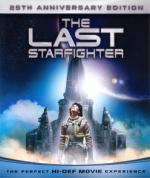Members
Stats
Users Online Users: 0 Users: 0 Guests: 36 Guests: 36 Total: 36 Total: 36 |
The Man in the White Suit, a review by JonThe Man in the White Suit 4 out of 5  Sidney Stratton (Alec Guinness) is a quiet scientist working at Michael Gough's textile mill, but running unauthorised, costly experiments for which he is fired. He gets a menial job at another mill and through a fortunate turn of events gets access to their science lab, where he successfully achieves his dream: a material that is indestructible and never even gets dirty. Stratton's dream though, turns out to be a nightmare for the industry as it could see them shut down. The Man in the White suit is one of Ealing's finest films and may just turn out to be their most resilient, as its themes are timeless and you will likely always find something about the story to identify with. Alexander MacKendrick's gives elegant direction to his political screenplay which can be interpreted several ways and still packs a punch that gets you thinking. That said, it isn't as fundamentally entertaining as the other comedies, despite some wonderful set-pieces especially during the experiments, but it must have been a difficult narrative to balance and it all pays off in the sobering final act. Guinness is brilliant, though slightly unlikeable, as the awkward and unintentionally sneaky scientist. It's important to note he has no motive except an innocent desire to pursue his talent, which of course we should all have the right to do. After some farcical and fun problems with the experiments almost destroying the mill, he succeeds and Cecil Parker immediately plans to produce it, first making Stratton the white suit of the title. As the industry starts to implode, he becomes a target for everyone. No-one seems to know what to do with him, even Joan Greenwood as the mill owners daughter, who takes up his cause and fiercely defends him. The problem is, he is absolutely altruistic, so no-one has a hold on him. All he wants is for his invention to exist. No-one is a villain in this film, yet there is massive conflict. Why shouldn't Stratton develop his skills? The mill owners argue incessantly about how to do handle it, but they're in business to make money, so why shouldn't they try to exploit what will surely be the perfect fabric and so the natural endpoint of their industry? But the workers can't allow it to exist otherwise their jobs will be at risk. The status quo may be boring, but it's about survival. It's Capitalist versus Socialist and the story demonstrates the delicate balance that we all need to live in. Greenwood's role starts off a little pointless (the relationship with Gough seems forced and unresolved, though maybe I've missed something), but she adds another interesting layer when her father and the other owners try to bribe her to exploit her friendship with Guinness and she becomes a passionate thorn in their side. Because Stratton represents a problem for all the other characters, he has little chemistry with anyone and so is hard to identify with for the viewer and occasionally the plot comes undone because of the awkward way he interacts with the other characters. Still, it is the nature of the beast because he is a fascinating construction. He has no back-story and no arc to follow; in effect he is the unknown variable introduced only to demonstrate how dangerous change can be. From a purely technical point, MacKendrick's narrative is a fascinating example of how to structure a screenplay (following the 'equilibrium' theory, the Stratton character is literally the embodiment of the second stage disruption). So it's dry and political and is like catnip for film nerds! But at just 85 minutes, it's also concise and the typical Ealing wit and farce is still present, so it's great fun too. (From A Feeling for Ealing... on April 18th, 2010) The Last Starfighter, a review by addicted2dvd
Stars: Kay E. Kuter as Enduran Dan Mason as Lord Kril Lance Guest as Alex Rogan Dan O'Herlihy as Grig Catherine Mary Stewart as Maggie Gordon Barbara Bosson as Jane Rogan Plot:Extras:
My Thoughts: This is the first time I have seen this one in years... probably since it first came out in the '80s. The story holds up well... even if the special effects has not. But then would you really expect them to on a film like this? I found this film to be a lot of fun. I have read reviews putting down the Beta Unit... the robot that stayed on Earth to tak Alex's place. But I enjoyed those scenes as well. This one is well worth the time put in to watch it. This is one I recommend checking out if you never seen it. My Rating:  (From What Movies I Been Watching on August 11th, 2014) Star Trek: Deep Space Nine - Marathon, a review by DJ DoenaDisc 2 Babel 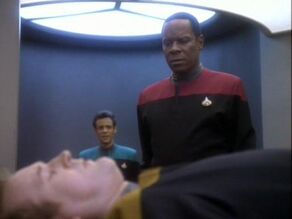 My Opinion: It was an average episode, but we've seen Odo and Quark working together for the first time and that was fun. Captive Pursuit 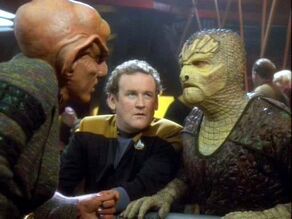 My Opinion: Genetically implemented "To the death!" mentality will become a common theme in DS9 and I think the characters handled this situation very well. They've bend the Prime Directive ("no interference in the business of other cultures unless asked to") without breaking it. I don't think Picard could have handled it better. Q-Less 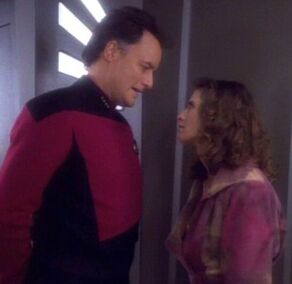 My Opinion: Unfortunately this was the only appearance of John de Lancie in his role as Q on DS9. Stories with Q have mostly been interesting and this was one of them, especially (again) to point out the differences between Picard and Sisko. I really liked it when Sisko punched Q square in the face and he wasn't expecting that. Dax 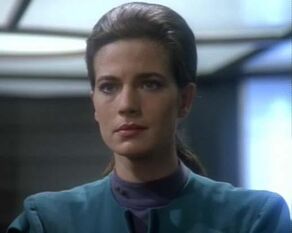 My Opinion: I liked that episode. It reminded me of the TNG episode where it was discussed whether or not Data - as an artificial life-form - has the right to make his own decisions. They had some compelling arguments for both sides and since the minds of host and symbiont have been truly merged it isn't as easy as it would be with Stargate SG-1's Goa'uld/Tok'ra. I also find it fascinating what we will learn about Curzon throughout the show without ever meeting him (except for that short flashback in the pilot). (From Star Trek: Deep Space Nine - Marathon on September 20th, 2008) |



 April 27, 2024, 09:22:02 PM
April 27, 2024, 09:22:02 PM